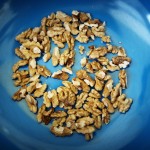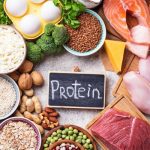 Are you a lover of nuts, but have been avoiding them because you think they are too high in fat? Well, there’s good and bad news. They are high in fat, but they do have several health benefits. That means that moderation is the key when eating them, as is the case for all foods.
Are you a lover of nuts, but have been avoiding them because you think they are too high in fat? Well, there’s good and bad news. They are high in fat, but they do have several health benefits. That means that moderation is the key when eating them, as is the case for all foods.
Not only do they taste good, but nuts and seeds are a good source of several nutrients. For instance, almonds provide 90 mg of calcium per 23 almonds (one ounce or 28 grams). This amount also provides 75% of the recommended intake of vitamin E for adults. Brazil nuts, hazelnuts, and pecans are a source of phosphorus and thiamin. Sunflower seeds provide folate, and pumpkin seeds provide potassium.
Nuts and seeds have heart health benefits as well. These benefits come from the type of fat. Nuts and seeds contain a high percentage of monounsaturated and polyunsaturated fats, which do not promote heart disease in the way that saturated fats do. This type of fat may lower total blood cholesterol, as well as LDL (“bad”) cholesterol. Walnuts and flaxseeds contain omega-3 fatty acids. Several studies have linked a high intake of omega-3 fatty acids with a reduced risk of heart disease.
The fiber in nuts and seeds also benefits heart health. One serving (28 grams or 1 ounce) provides approximately 3 grams of fiber. Flaxseeds contain a type of fiber called lignans. Lignans have antioxidant properties, which may protect against heart disease and cancer.
Besides their health benefits, a little can go a long way in improving the flavor and the nutritional value of foods. Here are a few ideas:
-
Use walnuts or pecans in place of chocolate chips in baked goods
-
Top a green salad with toasted sunflower or pumpkin seeds instead of croutons
-
Add cashews to a stir-fry instead of meat
Although nuts and seeds have a lot of benefits, they do have a down side. As much as three quarters of their calories come from fat. And if they are purchased already shelled, they may be coated in salt. That doesn’t mean you shouldn’t eat them, it means a handful is a serving. So go ahead and enjoy the benefits of nuts and seeds, but in moderation!
WRITTEN BY THE PUBLIC HEALTH NUTRITIONISTS OF SASKATCHEWAN
Originator: Jenny Okroj, Regina Qu’Appelle Health Region
References:
“Epicurious Food Dictionary”, www.epicurious.com/.
“Flax Facts”, UC Berkeley Wellness Letter, Vol. 18, No. 8, May 2002.
MayoClinic.com, “Nuts and Seeds: Core Ingredients of a Healthy Diet”, April 16, 2004.
The Reader’s Digest Association. “Nuts and Seeds”, in Foods That Harm, Foods That Heal. Montreal, Quebec: p. 251, 1997.






